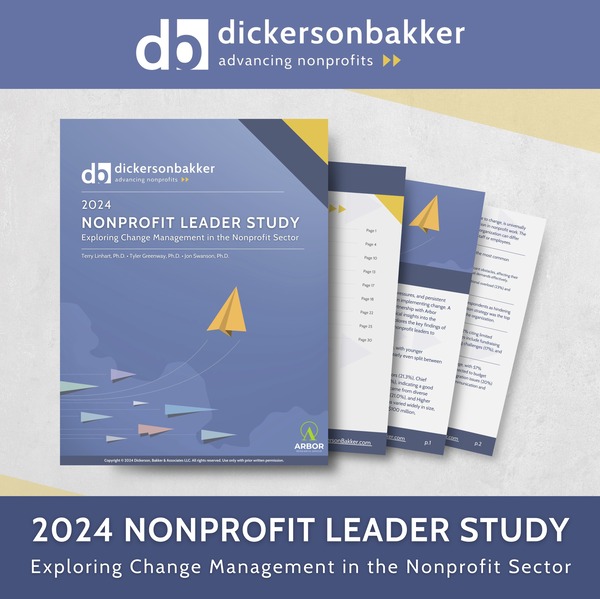Many U.S. Nonprofit Workers 'Exhausted, Overwhelmed' Says New Study
Staff shortages, squeezed budgets create 'perfect storm,' hinder efforts to introduce change

NEW SURVEY: U.S. NONPROFITS STRUGGLE TO INTRODUCE CHANGE: Staff shortages and squeezed budgets are hindering efforts to introduce change, says a comprehensive new survey conducted for fundraising consultancy firm DickersonBakker.
NEWS PROVIDED BY
DickersonBakker
Sept. 24, 2024
DALLAS, Sept. 24, 2024 /Christian Newswire/ -- A major new study reveals challenges in America's vital nonprofit industry that are holding back change and leaving many workers "exhausted and overwhelmed."
Many frontline workers in nonprofit social services programs, private schools and other charitable causes urgently need more support, according to findings in the 2024 Nonprofit Leaders Survey conducted for fundraising consultancy firm DickersonBakker.
"Limited staffing, squeezed budgets and gaps in communication create the perfect storm for employee exhaustion and staff turnover," said Derric Bakker, president and CEO of DickersonBakker. "This severely hinders efforts to introduce change — and the ability to change is crucial at a time when organizations face multiple challenges to adapt, grow, and even just to survive.
"However, despite all the challenges, there has never been a better time for nonprofits to grasp the opportunities and expertise available to them to change and grow," Bakker said.
The nonprofit industry in the U.S. employs more than 12 million workers at some 1.5 million registered charitable organizations, including humanitarian aid agencies, rescue missions, churches, and Christian schools.
Nearly 8 out of 10 survey respondents cited staff shortages — along with employee exhaustion — as the most pressing issue they face, especially when trying to introduce change.
In particular, many K-12 private schools struggle with staff shortages and the stress it brings, according to the survey report.
'Overwhelmed Staff Could Head for Exit'
With many nonprofits experiencing high staff turnover, greater priority should be given to training and supporting employees. Many of them "feel overwhelmed," the study says, and that means they could head for the exit.
But while frontline workers favor investing in staff training, many nonprofit leaders favor expanding programs or creating new ones, survey results show.
Over half of the responses said staff turnover had interrupted efforts to introduce organizational changes that could have produced positive results.
Tighter budgets are another major concern, with nearly three-quarters of survey respondents citing budget constraints as a big obstacle to implementing change, such as technology innovations.
Challenges are interconnected, the study suggests.
"Exhaustion is always tied to staffing issues, which is always tied to budgetary limits," say researchers Terry Linhart, Tyler Greenway and Jon Swanson at Indiana-based Arbor Research Group, which carried out the study.
Overcoming Resistance to Change
Many nonprofits are also struggling to overcome resistance to change in the workplace, with just over half saying introducing change is a challenge, often tied to poor communication, inertia, and the traditional way of doing things.
The report recommends nonprofits should prioritize employee well-being and work-life balance, invest in a comprehensive communications strategy, ramp up fundraising efforts, and consider using external experts to fill staff gaps.
The online survey involved more than 600 nonprofit leaders and frontline workers representing U.S. charitable organizations, churches, and private schools with annual budgets ranging from less than $500,000 to more than $100 million.
To view the report, click here.
MEDIA: To arrange an interview with Derric Bakker, contact: Gregg Wooding, (972) 567-7660, gwooding@inchristcommunications.com
OR DeWayne Hamby, (423) 505-0041 (text or phone), dhamby@inchristcommunications.com
DickersonBakker (www.DickersonBakker.com) has been providing professional fund development consulting services to nonprofit organizations for nearly fifty years. With offices in Texas, Indiana, and North Carolina, and full-time team members in many states, the firm has served thousands of nonprofits located across the U.S., Canada, and overseas.
SOURCE DickersonBakker

